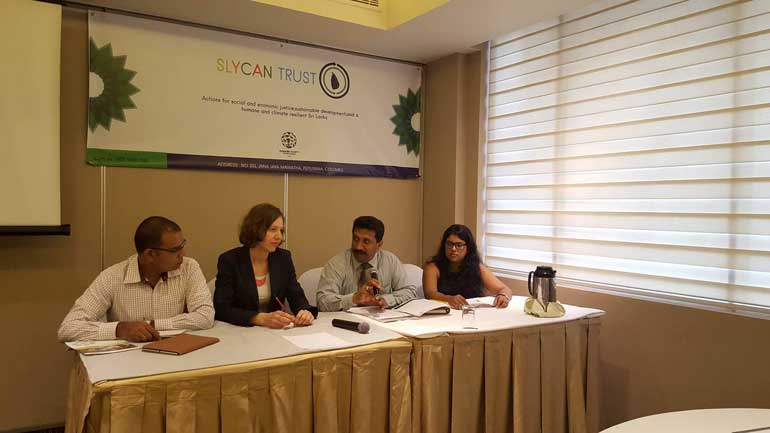Sunday Feb 22, 2026
Sunday Feb 22, 2026
Monday, 9 May 2016 00:00 - - {{hitsCtrl.values.hits}}

SLYCAN Trust with the knowledge contribution of Climate Action Network South Asia, and the Climate Change Secretariat of Sri Lanka, conducted a workshop on Climate Finance on 5 May in Colombo. Policymakers, government officials, CSOs, media and public attended the workshop to discuss the need for climate finance, climate change in Sri Lanka and adaptation in the agriculture sector.
“Climate finance is one of the main building blocks in the climate change negotiation forums. There is a dire need for climate finance to address loss and damage and implementing the National Adaptation Plan. We do have a big challenge ahead and there are a lot of changes and compromises to be made,” said Climate Change Secretariat Director Dr Sunimal Jayathunga.
Chief Executive Officer, Janathakshan Ranga Pallawala explained, “climate finance is important to change the system without dilapidating the existing social and economic systems.”
He also spoke on the challenges inherent in balancing timely access to finance and its efficient use with strong fiduciary standards, accountability and institutions.
Coordinator of the Adaptation Fund NGO Forum Lisa Junghan emphasised the importance of making climate compatible investment in all sectors in line with the Paris Agreement, but highlighted the finding that funding needs for adaptation were likely to increase steeply in the future.
“A larger share of public finance needs to go towards adaptation, while banks and other investors should by now realise that the future economy is low carbon and climate resilient,” Junghan said.
The Policy and Advocacy Coordinator of Climate Action Network South Asia, Vositha Wijenayake highlighted the importance of inclusivity in decision-making for adaptation, introducing the Joint Principles for Adaptation, which lists seven principles that civil society organisations across the world consider as benchmarks for good adaptation processes.
“They are a tool for ensuring that national policies and plans meet the needs and safeguard the rights of the most vulnerable people to adapt to climate change” she said.
She added, “There is need for transparency and accountability of the investment of climate finance. It is important to invest in human skills development which will help build resilience to impacts of climate change. The money should be invested wisely, and to reduce vulnerabilities. Not only to build infrastructure. This needs to be incorporated when implementing our National Adaptation Plan.”